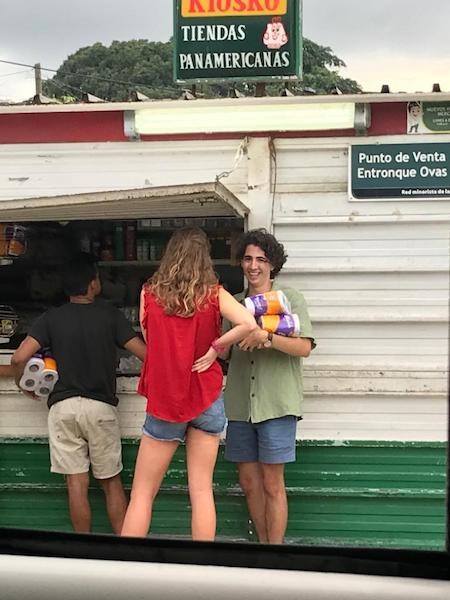
The following post was written by Global Gap Year Fellow Jacob Gerardi.
Oh my GOSHHHH!!! Firecrackers were going off in my brain as my fellow gapper Ella and I walked into a small market on Calle San Ignacio. Eggs!
The hunt for groceries in my suburban hometown was quite easy. For all and any product, we made pilgrimages to Wegmans. For those of you from other regions of the country then I, Wegmans is essentially the Disneyland of grocery stores. Every product you could need for any recipe is available at Wegmans, except for the occasional foreign ingredient which could be bought elsewhere at import stores. Searching for groceries in La Habana, Cuba, the other hand? Well, it’s a good bit more difficult. Some markets, like the one on Calle 17 y K, have lots of vegetables and some other products like Yuca root, avocado, or black beans. The market further down on Calle 17 y C has a HUGE variety of various vegetables. A store at the FOCSA building carries some pasta, European packaged cookies, ketchup, and sometimes other goodies, while a gas station a few blocks down has even more. We have our favorite market on 25th and 12th with imported Italian pasta and occasionally olives, plus the tienda in Habana Vieja’s San Ysidro neighborhood where we have twice found an extremely coveted item: toilet paper. The idea that groceries would be found in one, central store is completely foreign to La Habana. Everyone is always on the hunt, and you never know where you’ll run into an unusual to find grocery item. This city, populated well beyond what it was originally intended to hold, experiences frequent shortages.
In the countryside, these shortages are less frequent. When I was returning from a day to the Valley of Viñales with my family (who was visiting), we stopped at a roadside food stand. There, we found a cornucopia of goods, from toilet paper to chicken sausages, canned tomatoes and tuna, and ground beef (!!!). The joyous expression on Ella and I’s faces were quite confusing to those around us, but we simply couldn’t contain our joy in finding many items that are near impossible to locate within the city of Havana.
In the United States and other nations of extreme wealth and privilege, we have come to expect everything instantly. That we would wait in line is unthinkable, and often causes anger in the US at locations like the DMV. In Cuba, nearly every store has a line out the door, whether a small market, a bank, a currency exchange, or even many roadside cafeterías (small, often outdoor take-out restaurants). Things I’ve always taken for granted, like food cooked in butter, are hard to come by here. Upon the conclusion of her visit to Cuba, my mom texted me from a food court in Atlanta airport, saying she felt shock from seeing so much food when just 90 miles south of Florida, such food courts don’t exist. When I return to the United States in two months, my awakening is sure to be even harder.
While through my eyes, conditions are difficult here, I am nonetheless conscious of the fact that my status as comparatively wealthy gives me huge advantages even in a socialist nation. When I stumble upon a can of olives from Spain, I can spend $3 on them without worry. Many locals aren’t able to do the same. Living on a gap year fellowship monetary stipend of $8,000 gives me huge privilege and freedom here, meaning I’m not truly as immersed into the realities of life here as I could be. It has been both frustrating and liberating for me to live abroad as an American, specifically an American under the privileged economic umbrella of this fellowship. I have often been frustrated, feeling I stick out in public due to my only intermediate handle on the Spanish language. Further, it can be draining to feel as though I am a representative of an often controversial, frequently imperialist nation. Taking a gap year, even when it’s not one I’m paying for due to the generous fellowship, is inherently a mark of privilege.

That said, it has surely made me step back and examine conditions here versus those back home. It is important to recall that while I feel it can be difficult to grocery shop here, there do exist many, many options for food, even if it’s variance isn’t as wide as I might be used to. The same cannot be said of many urban, inner-city areas in the United States. A gap year is an amazing, unmatchable chance to go abroad and experience life in a foreign country at a deeper level than many people will ever have the chance to. Still, it is important to recall that before we make rash judgments as to the difference in conditions of the countries we are calling home for a few short months in a short year, we first look towards our homes.
As many of us return from our first placements this month and the holiday season approaches, I intend to bear this in mind and continue to examine the structures of power that create differences in access to resources. When I do this, however, first I will think about the place I know best, have called home for the longest, and have the deepest context in. Three months of life at a high economic status in Cuba is merely dipping my foot into the water of this nation’s deep culture and history, and thus I’m not at all qualified to make judgments on their nation. That which I am, however, is the nation that I call home.
